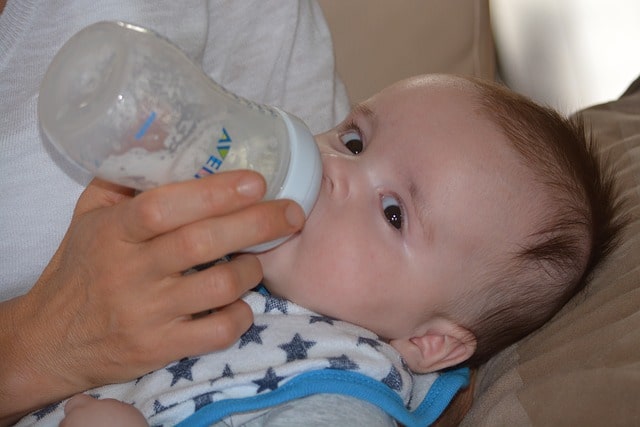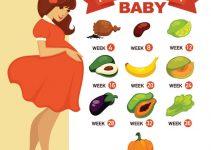Fed is best! Let’s start there and we’ll end that conversation there as well. One thing this article is not going to be is about the pros and cons of breast milk vs formula.

Here, the goal is to discuss other forms of milk when it’s time to make the transition to a different kind of milk for your baby, guidelines as to when this is acceptable, and, if goat milk, specifically, is something safe for your baby.
Now that we’ve gotten that out of the way, let’s discuss actually giving your baby goat milk.
When to Make the Switch to Something Other than Breast Milk or Formula
For the first year of babies’ lives, they should survive on breast milk or formula until they are at least 6 months of age because other kinds of milk are not adequate sources for vitamin E, iron, essential fatty acids, and may contain too much protein, sodium, and potassium.[1]
As far as breast milk and formula milk are concerned, both are made specifically for your baby’s nourishment (and if anyone has ever seen the difference in breast milk when a baby is sick vs when they are healthy, it’s amazing) and provide all the appropriate nutrients for your babies growth.[2]
But let’s focus on the safety and appropriateness of goats’ milk for children (at this point we’ll discuss over the age of one since it’s already been stated that children under one shouldn’t be given milk of any kind).
Goats Milk and Why it’s Chosen
There are a few reasons as to why families might choose to use goats milk instead of cows milk.
Some people prefer the taste of goats’ milk.
Some of the basics between cows’ milk and goat milk is that goats’ milk is said to be easier to digest due to the smaller fat molecules in the milk.[3]
Some might consider this a better option than regular milk because they have trouble digesting cows milk.
One of the reason it’s said to be easier to digest is because it has less milk sugar (lactose)[4], which some people have an intolerance to and goats’ milk can be an alternative to cows milk for such people.
There are also cultural reasons for using goats’ milk in other parts of the world, so while the western world seems to prefer and utilize cows milk more often, more than 65% of the world enjoys and drinks goats milk more often.[5]
In impoverished countries and places that have regular refrigeration, a goat can provide them with the nutrition they need. One goat can produce about a gallon and a half of milk daily[6], which is a great amount for a family, especially those who cannot afford to either care for a much larger animal, a cow, or store their milk.
So now that you know the background, is it or is it not ideal for your little one?
Is it Safe and Appropriate for your Baby?
The nutrients are not the same in goats milk. One of the main reason for not considering goat milk ideal is the lack of sufficient amount of folic acid. Children have a recommended daily allowance (RDA) of 75-100mcg of folic acid per day.
For every glass of cow’s milk, a child is getting 12mcg vs the 1mcg in one glass of goats milk.[7] If you are feeding your child goats milk, it has to be supplemented with folic acid containing food.
Again, it’s not appropriate to use goats’ milk before 12 months (just like cows milk) and formula should be given if you cannot breastfeed (and that’s completely okay as well, fed is best).
If given too much milk, children can be subjected to anemia and poor growth due to high sodium content, high chloride, and potassium present in milk.[8]
So in reality, if your baby is under a year old, don’t use goats milk. Use a formula that is already made or breast milk. Again, these are specially formulated for babies and tailored to their specific nutritional needs.
Some people try to make their own formula because they want to be that “crunchy” mom, but can lead to serious nutritional imbalances in a baby[9], and that’s not something you’ll want to have to deal with because proper nutrition is everything for the proper growth of your little one.
Goats’ milk itself doesn’t contain sufficient quantities of micronutrients such as folate, vitamin C, Vitamin D, thiamin, niacin, Vitamin B6, and iron.[10]
So just to be safe, don’t use goats milk for your baby. If you want to use it when they are older, ensure that you are using diet supplements too.
Ensuring that they have the proper nutrition now is essential to making sure that they have no issues with development in the near future.
References
- Giving Baby Dairy Whole Cow Milk. [Link]
- Feeding Guide for the First Year. [Link]
- Stephanie Jeong. Goats Milk vs. Cows Milk – What’s the Difference? [Link]
- See Above #3
- Nora Landis-Shack. Apparently, 65% of the World Drinks Goat’s Milk Over Cow’s Milk. [Link]
- See Above #5
- Dr. Bill Sears. Goat Milk. [Link]
- Kelly Bonyata, IBCLC. Is it Safe to Use Cow’s Milk or Other Milks as a Supplement to Breastfeeding? [Link]
- A. Pawlowski. Sorry, Kristin Cavallari: Homemade Formula, Goat’s Milk are Bad News for Babies. [Link]
- See Above #10



